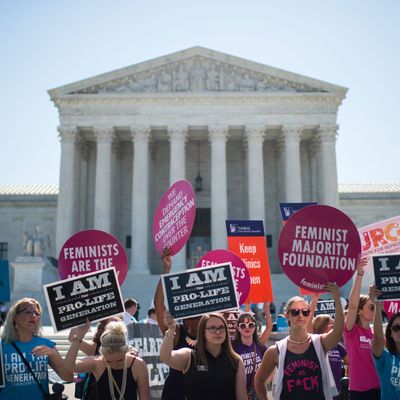
Only formalities stand in the way of the Supreme Court, as currently constituted, slashing abortion rights as we know them, which is why the court’s punting on two choice-related cases came as something of a relief for progressives on Monday morning. Planned Parenthood is celebrating today’s win, which ensures that Medicaid patients can continue to choose its affiliates to get their birth control and their tests for sexually transmitted infections and cervical cancer.
Accusing the Court of a “refusal to do its job,” archconversative Justice Clarence Thomas wrote in his dissent from the order: “I suspect it has something to do with the fact that some respondents in these cases are named ‘Planned Parenthood.’ That makes the Court’s decision particularly troubling.” An order that elicits a dyspeptic dissent from Thomas, co-signed by Samuel Alito and Neil Gorsuch, and accusing his colleagues of cowardice has got to be a good one for liberal policy priorities, right?
Then there’s the matter of court math. It takes four votes to take a case, and conservatives John Roberts and Brett Kavanaugh both opted to vote with the court’s four liberal justices, declining to play on Gee v. Planned Parenthood and Anderson v. Planned Parenthood. Some conservatives are already reading this as pro-abortion apostasy.
But pro-choice advocates are reluctant to read too much into Kavanaugh’s vote. “I don’t think this is a harbinger of what’s to come,” says the ACLU’s Brigitte Amiri. “To the extent that people are saying that this shows where the Supreme Court, newly configured, is going to be on access to abortion questions, this case does not present that.”
That’s because the two cases the court declined to hear involve interpretations of Medicaid law, not the right to access an abortion or how states can regulate it. They involve challenges to moves in Kansas and Louisiana, among many other states, to prevent Medicaid patients from choosing Planned Parenthood for non-abortion services. (Disclosure: I have given paid speeches to Planned Parenthood affiliates about my book, including the Gulf Coast affiliate that is one of the parties in this case.) The challenger’s argument is that the restrictions violate Medicaid’s provisions that allow people to freely choose their participating provider. The states in question respond that patients have no such right to sue them.
While it is true that these cases aren’t technically abortion cases in the jurisprudential sense, I’ll give Thomas this: They’re freighted with abortion politics. These states didn’t randomly cut off Medicaid reimbursements for Planned Parenthood — they did so to punish the organization’s affiliates for refusing to stop performing abortions. Everything else is elaborate pretext, including the state governments’ disproven claim that Planned Parenthood broke federal law with “the illegal sale of fetal organs” as Thomas helpfully repeats.
If you’re unfamiliar with the intricacies of the abortion wars, that refers to the secret-camera videos made back in 2013 by James O’Keefe acolyte David Daleiden. States were defunding Planned Parenthood before the videos, and after them. And even on their own terms, the videos failed to yield any evidence of criminality. In fact, over a dozen states investigated — including Kansas, Missouri, and Louisiana, the litigants in these cases — and have until this day brought no charges. And despite the fondest dreams of their anti-abortion allies and the urging of Republicans in Congress, even Jeff Sessions’s Department of Justice has done nothing after looking into it.
In the end, the decision by Kavanaugh — particularly so soon after being the subject of sexual-assault allegations — and Roberts not to wade into this particular muck may mean nothing more than the fact that one or both of them would prefer a different battle. But when it comes to this Supreme Court, even a less-bad day is a good one.





